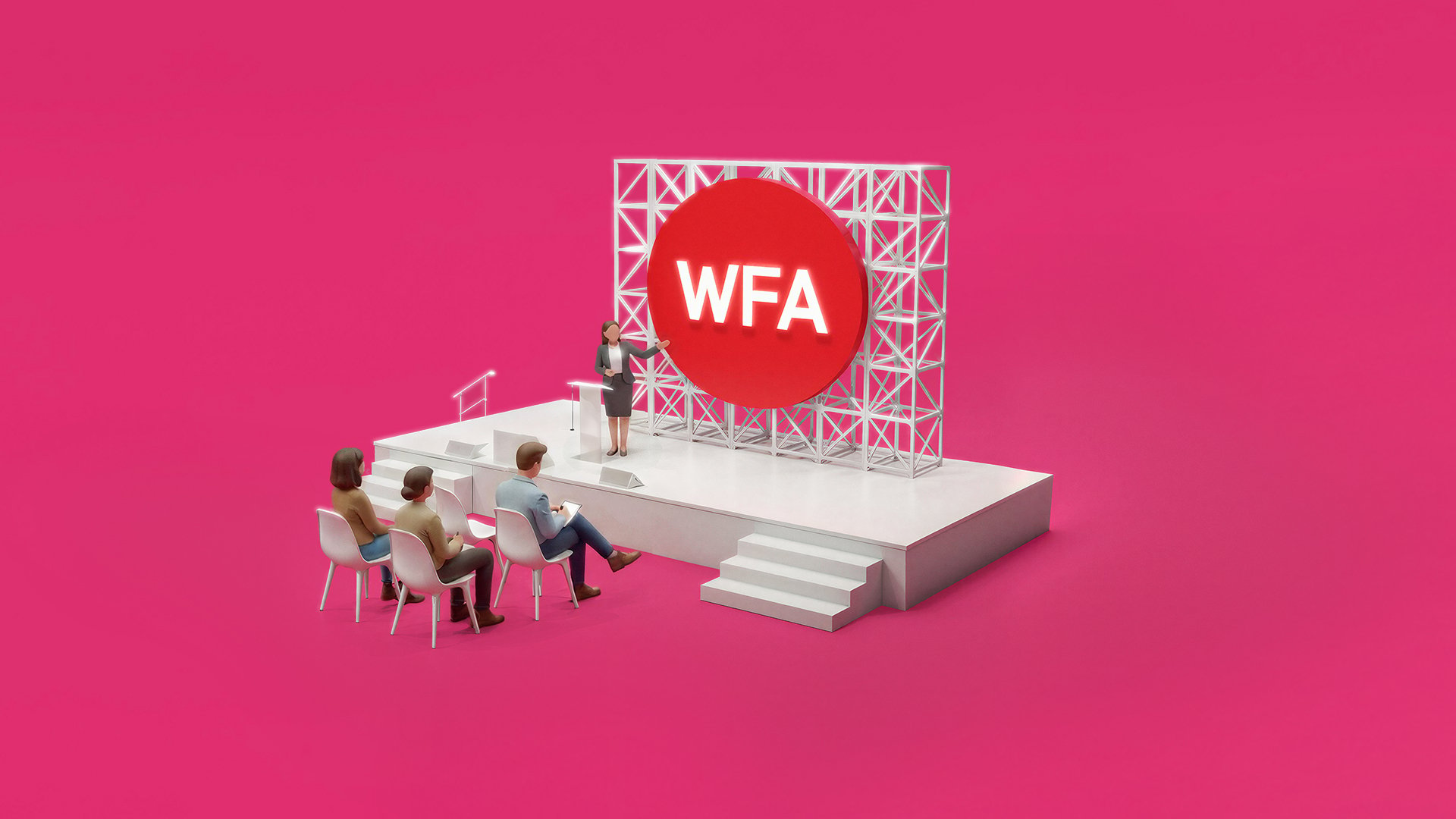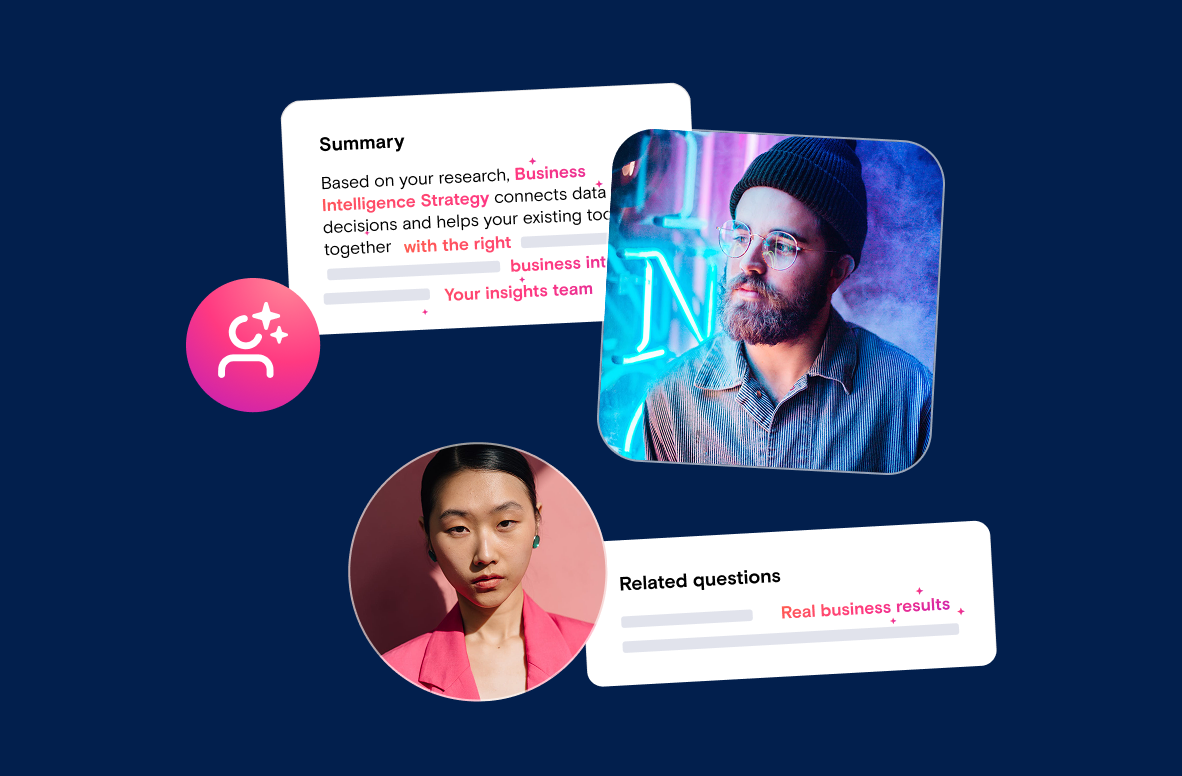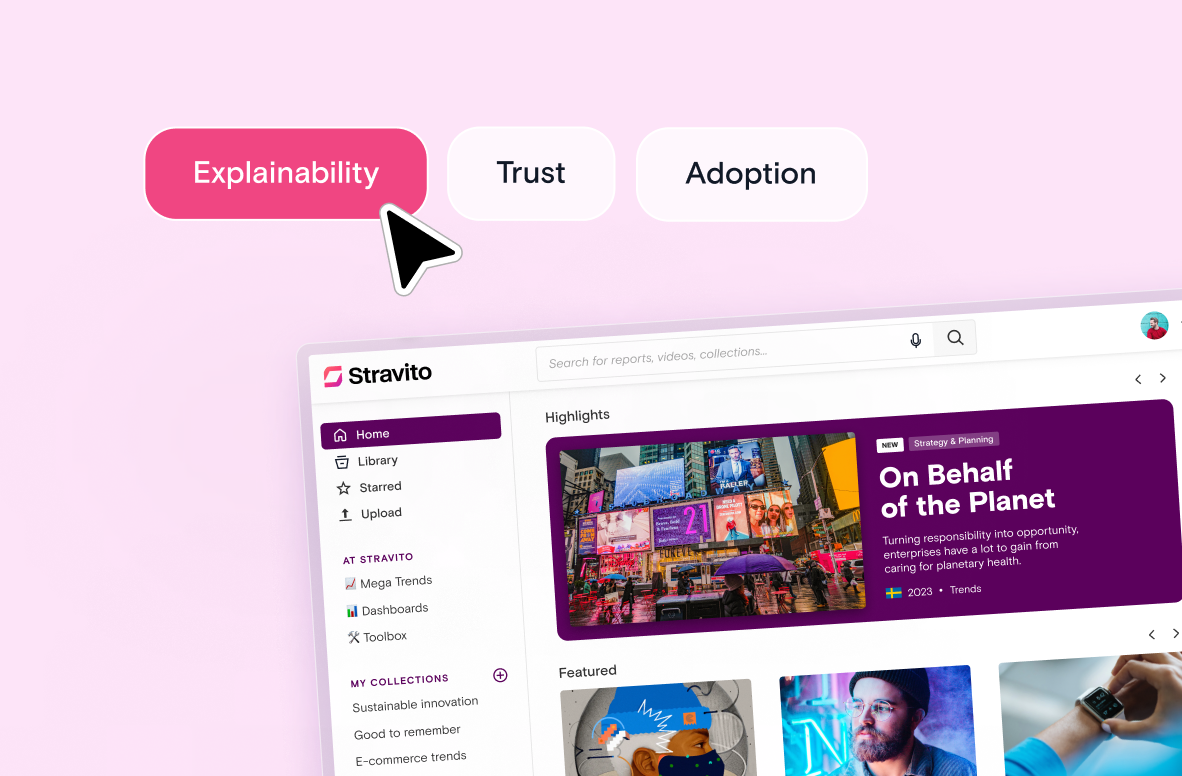What goes on inside the minds of a challenger brand?
In this episode of Spotlight, Stravito CEO Thor Olof Philogène interviews Stefan Lagerqvist, the CEO of Nick's, a fast-growing challenger brand in the healthy snacks space. For over 10 years, Stefan worked in commercial roles with multinationals like Procter & Gamble and more recently Unilever. But earlier this year, he left corporate life at the global giants to become the CEO of Nick's, who already has a retail presence in thousands of outlets around the world, and has received notable investments from established VC firms.
T: So Stefan, to kick things off, why? Why did you leave the giants to take on this role on a challenger brand?
S: So I think it's worth saying that I enjoyed both workplaces a lot, working with the big giants. But I think having done so for 10 years, I always said to myself that if I were ever going to exit, it would not be for a third one.
I thought I would do something that I felt even more meaningful. The idea of being part of building something where you can have a really, really big impact was very attractive to me. And then obviously also something that does good for society, kind of added to that. So it was not like I was looking actively, but that thought was always in the back of my mind.
And then someone asked me if I could meet up with the chairman of Nick's for a potential CEO role. I thought to myself, “That sounds very uninteresting, but I'll go meet him because he seems like a nice guy”. A couple of months later I had signed the contract, and I haven't regretted it a second since.
T: And if you take a look back at all those years, and before taking on the role you've now taken on, what are the biggest learnings you took with you? Do you have any particular stories you could share?
S: Yes. In general, it's obviously a lot of experiences, processes, and know-how that you acquire among these types of big companies. I mean they’re after all like giant schools that spit out a lot of good talent. But one thing that I really brought with me was what I would refer to as value-driven, servant leadership.
"But one thing I've always learned is to always do the hard right, before the easy wrong."
On one hand, it's really being value-driven. It's easy to forget that these big corporations are. But one thing I've always learned is to always do the hard right, before the easy wrong. And that's something that these big companies stand behind. I think many smaller players sometimes just take the easy way out, and that typically comes back to bite you in the end, even if it doesn't feel like that at that time.
And then the second part is obviously the servant leadership, which is the idea that leadership resides around my team knowing everything a lot better than I do, because they are closer to the business. And my role is to help them make the best decisions and remove barriers, and help develop them over time, because that will be their path to success.
For me, a personal experience that meant a lot was when I worked with Procter & Gamble and was the group controller. The Nordic CEO was supposed to write their annual letter to the global CEO, and at a company like P&G, that's a very important thing, given U.S. hierarchical structures. And the letter she had written was pretty shitty, and then I kind of asked her and said, "I don't think this is a good letter. I don't think it will get good reception, so I suggest we do it differently."
And then coming back to servant leadership, and wanting to develop and challenge people, she simply asked me, without any prestige, and said, "Okay, give me your proposal, what you would write."
"I will always back my people and then try to challenge them to deliver what they can while doing so."
So I wrote our annual letter with the business results and stuff. And she ended up sending that to the global CEO. Seeing someone take that personal prestige risk meant a lot, and that's something that I've carried with me. I will always back my people and then try to challenge them to deliver what they can while doing so.
T: Wow, that's pretty incredible that she actually did that, and I think that tells a clear story. But if you take kind of a different viewpoint, and you instead ask yourself, what would you say is the main thing that the more established players, these big companies, don't understand? What is it that they get wrong about challenger brands?
S: I think the bigger companies, in their assessments of smaller brands, when you are in the commercial frontline in market organizations (like a Nordic Office would be), I think they get it pretty right in the sense that they know why challenger brands are here, they know why a lot of small brands are winning, and so on.
The problem they have is what they should do about it. And I think that goes back to the ownership of the companies and the expectations. Because if you take a bigger look at it, for many, many years, Procter & Gamble, Unilever, all these companies, they achieved a good top-line growth, especially when emerging markets were growing. So the stock markets expected them to grow 5-10%. They delivered that year-on-year, and everyone was happy.
Then emerging markets stopped growing a little bit. And if you don't grow your top line or your revenues, you need to grow your profits. So you need to focus on margins. Now, that has obviously led to these companies being fantastic in producing what they do, marketing and selling it at extraordinary good margins. If you think about it, you typically have one person doing marketing for one brand, in the entire Nordics, with revenues of many million dollars.
"If you're about to start a new brand, it will be painful, it will take time, and it will for sure not in the short term, be profitable."
If you're about to start a new brand, it will be painful, it will take time, and it will, for sure not in the short term, be profitable. And if your company's idea and the expectation from the stock market is to make more money, and you come up with an idea and say, "Hey, today I'm Mondelez, I produce chocolate, so made from sugar and wheat. That's super cheap ingredients. I do millions of them by the day." And then someone says, "Come up with new recipes and more expensive ingredients, and it's probably more difficult to do them. Let's try to do so."
Of course, they would sit and try to figure out “How can I make money from this in the same way?”, always comparing it to what they do. So I think this is leading big FMCG or big CPG into becoming what big Pharma has been for many years. When those companies sort of lose out on innovation pace, but instead they acquire smaller companies that have proven successes, and then they are this huge global distribution and marketing machines that can roll out the products in a pace that these smaller companies are not able to.
T: And if you would have the benefit of time in a different way, and you could have the ability to go back in time–so let's suppose you go back 10 years in time and you give yourself some advice, maybe drawing some learnings from what you've just said, what would that advice be?
S: In general in business, there's obviously one thing about seeding new things. I think the big corporations for too long look at ways to improve the margins and just make things cheaper, therefore making more money. And then they allocate resources to that, instead of seeding new business models, ideas, brands, or whatever it is. So I think that would be something.
Of course, that's on a macro level. And 10 years ago, Stefan, the furthest down in the food chain as a financial analyst, would probably not have not been able to do a lot. And I think on a more personal level, what advice I would give, and this is more relevant now than ever–I would say it's to pick up the phone. Because people today are so reluctant to talk to people directly. There's this immense game of email ping-pong that never resolves any problem. It just wastes time. And it’s bound for misunderstandings.
"There's this immense game of email ping-pong that never resolves any problem. It just wastes time. And it's bound for misunderstandings."
Instead, I mean now in COVID times it's difficult to get people physically in a room, but at least virtually in a room, get things on the table and sort of discuss them openly. Because this written communication that we are doing, it just wastes a lot of time (when it comes to more difficult methods of course) than just a simple transactional question.
T: I think that's great advice. And I think a lot of us in this time period of COVID really miss that also – at least I'm very much thinking about that given the current state. Before doing this webinar, we did a preparation call. And I remember that you told me that Nick's are making really bold new bets as a result of some new market and consumer insights. What were those, and what are you up to now?
S: In my perspective, the whole consumer game (and really any product or business) starts around having a good insight and acting on that insight. And then you will either do good or bad if you manage to meet the need or demand that's out there.
Nick's was built on the idea that there's this mom, a progressive mom, who today buys wafer chocolate bars for her kids. And she doesn't really want to give them sugar, but there are no alternatives. So if we could provide her with an offering that tastes very similar, but is without sugar, she will buy it.
And for those who work in marketing, you know that you kind of paint out the target group and then you try to design for that target group. The team here at Nick's did an amazing job in designing a brand and products, speaking to this mom. And then last fall, when we felt the brand metrics weren't increasing as strongly as we wanted them to, we started doing a little bit of brand research.
This was started before I came in, so this was sort of happening during my recruitment process. And then we saw that when we looked at the different target groups and their perception of the brand, we saw that the worst brand awareness was among our target group – these progressive moms.
And those actually knew about the brand, they didn't like it. So consideration was low, and then the conversion or purchase intent was like rock bottom. The interesting thing was that the team here had managed to build a brand targeting the wrong audience, marketing to the wrong audience, but doing it so well that it was still a sizable business. So then we looked at who likes the brand the most.
And that’s when we found this target group that we called “trendy strivers”. So again, it's not about demographics, but they over-index in the younger age groups, and they are predominantly female. And then you kind of go back and say, “Okay, what's important in this category?" Then we realized that, taste, that's the number one in snacking categories. And lifestyle is important, and you have lifestyle products. And then you realize “Okay, we built a brand that we targeted to 40-something moms, but we want their 17-year-old daughters to buy it.” That was pretty fundamental.
"And everyone who knows anything knows that sugar tastes good, so the perception is obviously that the products don't taste very good."
Secondly, we realized taste is the most important. And the only thing we are shouting about as a brand (which is good, because it's our purpose), is about taking down sugar consumption – “Please join our fight on sugar”. And everyone who knows anything knows that sugar tastes good, so the perception is obviously that the products don't taste very good. So regarding our hypotheses that had been formed earlier, we realized that we needed to throw them in the bin and do something about this.
Since then, we have built an entirely new visual identity for the entire brand. We wanted to improve the experiences of all consumers, so we are relaunching all the recipes in our portfolio to much better taste and experience profiles. And we're changing all the packaging, as well, at the same time.
So in Q1, we are kind of launching Nick's 2.0 which will be super, super exciting. And then obviously a very insight-driven job, looking at how you can build your job around the hypothesis vs. building it around the insights. And then looking at how we can act upon the insights we have, which in the end will determine how well we can deliver, I think.
To get even more insights into how to maintain agility, overcome the challenges of building a new brand, and navigate 2021, watch the full webinar here.




